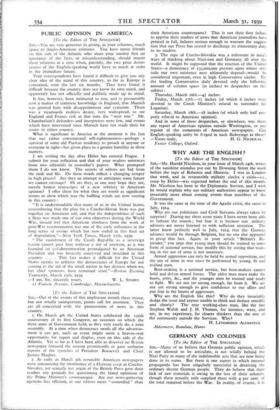PUBLIC OPINION IN AMERICA [To the Editor of THE SPECTATOR]
SIR,—You are very generous in giving, in your columns, much space to Anglo-American relations. You have many friends on this side of the Atlantic who share your anxiety that no ignorance of the facts, or misunderstanding, should impair these relations at a time when, patently, the two great demo- cracies of the English-speaking world have so much at stake in the immediate future.
Your correspondents have found it difficult to give you any clear idea of the mind of this country, so far as Europe is concerned, over the last six months. They have found it difficult because the country does not know its own mind, and apparently has not officially and publicly made up its mind.
It has, however, been intimated to you, and is presumably now a matter of common knowledge in England, that Munich was greeted here with disappointment and cynicism. There was a vicariously reckless desire, very widespread, to see England and France risk at that time the " next war." Mr. Chamberlain's defenders and interpreters were few, and events which have intervened since Munich have not made their lot easier in either country.
What is significant in America at the moment is the fact that our rather conventional self-righteousness—perhaps a survival of some old Puritan tendency to preach at anyone or everyone in sight—has given place to a greater humility in these matters.
I am writing the day after Hitler has entered Prague. I submit for your reflection and that of your readers sentences from two editorials in yesterday's papers. What prompted them I do not know. The secrets of editors are hid from the rank and file. Do these words reflect a changing temper in high places? Are they an attempt to anticipate some future we cannot envisage? Or are they, as one may hope they are, merely honest transcripts of a new sobriety in American opinion? I offer them for what they are worth as significant straws to show which way the baffling winds are now veering in this country :
" It is understandable that many of us in the United States, remembering that the plan for a Czecho-Slovak State was put together on American soil, and that the independence of such a State was made one of our• own objectives during the World War, should feel that American aloofness from the work of post-War reconstruction was one of the early influences in the long series of events which has now ended in this final act of degradation."—New York Times, March 15th, 1939 " The vanishment of the Czech Republic as a sovereign nation cannot pass here without a stir of emotion, as it was founded on self-determination promulgated by an American President and was basically conceived and moulded in this country. . . . This fact makes it difficult for the United States openly to criticise the democracies of Europe for not coming to the aid of the small nation in her distress when we, her chief sponsors, have remained aloof."—Boston Evening Transcript, March Isth, 1939.


































































 Previous page
Previous page